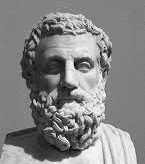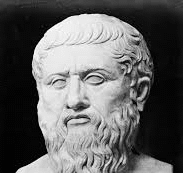Nick
Catalano is a TV writer/producer and Professor of Literature
and Music at Pace University. He reviews books and music for
several journals and is the author of Clifford
Brown: The Life and Art of the Legendary Jazz Trumpeter,
New York
Nights: Performing, Producing and Writing in Gotham
, A
New Yorker at Sea,, Tales
of a Hamptons Sailor and his most recent book,
Scribble
from the Apple. For Nick's reviews, visit his website:
www.nickcatalano.net
Language used to distort truth is as old as scripture. When
Satan tells Eve that if she eats the forbidden fruit she will
obtain something that God has withheld he is telling the truth
but cleverly deceiving her. What she and Adam receive when they
eat the Apple is ‘Knowledge’ which is a flawed process
obtained by a slow step by step struggle that is imperfect.
Before they ate the fruit they ‘knew’ everything
instantaneously as Heavenly spirits did; they didn’t have
to ‘think’ to get truth because they were perfect.
But after they ate they lost their instantaneous awareness and
they were fated to ‘learn’ only by the painful and
slow process of thinking.
The
habit of using language to deceive has been studied and analyzed
exhaustively. But the origin of the term ‘fake news’
in our democratic political arena can best be understood by
looking back on Ancient Greece and the time that the first democracy
began. About 505 B.C., after struggling to find an ideal system
of government, the Greeks fell upon pure democracy whereby all
citizens rich or poor had equal rights. Anyone who had an opinion
could stand up on the Pnyx hill in front of the Acropolis and
speak on an issue. After the discussions ended, a vote was taken
and majority rule won the day.
Athenians
were overjoyed. They had discovered that freedom for all was
the secret formula for universal justice. Gone was tyranny,
oligarchy, or any kind of monolithic rule. They had discovered
political perfection. They openly boasted about their new advancement
in civilization; they wrote literature celebrating their greatness,
 (Aeschylus’
Orestia trilogy still stands as great drama trumpeting
the new ideas of justice), they created magnificent architecture
to celebrate their many achievements. The Parthenon was erected
not to honour the Gods but to proudly honor the Athenians themselves.
(Aeschylus’
Orestia trilogy still stands as great drama trumpeting
the new ideas of justice), they created magnificent architecture
to celebrate their many achievements. The Parthenon was erected
not to honour the Gods but to proudly honor the Athenians themselves.
As
the democratic process continued to unfold in the legislative
assemblies during the next decades, something rather elementary
popped up. It became obvious that great power could be wielded
by those who could ‘speak’ better than others and
thus promote their own agendas. With predictable alacrity the
citizenry scurried about seeking to learn how they could better
orate and persuade the voters to accept their legislative proposals.
Soon the central marketplace of Athens (Agora) was flooded with
highly compensated teachers or sophists who rapidly came up
with myriad oratorical techniques. The term ‘rhetoric’
came into being -- speech uttered to persuade.
Most
grammar students know techniques such as begging the question,
false analogy, argument of transfer, hasty generalization, red
herring etc. But if you consult the Wikipedia glossary
of rhetorical terms you will find several hundred entries created,
labeled and taught by the Athenian sophists. Why so many? Because
the art of persuasive speech became a dominating weapon of power
in the first democracy.
At
first most observers praised the new science of Rhetoric and
celebrated the new uses of language to convey truth and educate
everyone. But soon astute thinkers came to realize that the
new science was insidiously evil. Talented speakers and knowledgeable
rhetoricians could use the techniques to twist the truth, promote
falsehoods and outright lie, while at the same time convincing
voters that they were righteous in their cause; they thus cleverly
persuaded people to go along with their agendas. Most ordinary
citizens did not understand how their minds were being manipulated.
Appealing to human emotion, concupiscence and innate prejudices,
and using this new rhetoric which was replete with logical fallacies,
the speakers were actually able to make wrong sound right and
vice versa.
Wise
figures such as Gorgias and Plato  studiously
outlined the ways rhetoric negatively manipulated peoples’
minds but the practices continued to grow. Learning from the
Greeks, Roman intellectuals such as Seneca and Cicero adapted
and refined the cunning and duplicitous techniques and their
Latin names for the logical fallacies long developed in ‘classical’
rhetoric are still with us i.e. argumentum ad hominem, non
sequitur, post hoc ergo proper hoc.
studiously
outlined the ways rhetoric negatively manipulated peoples’
minds but the practices continued to grow. Learning from the
Greeks, Roman intellectuals such as Seneca and Cicero adapted
and refined the cunning and duplicitous techniques and their
Latin names for the logical fallacies long developed in ‘classical’
rhetoric are still with us i.e. argumentum ad hominem, non
sequitur, post hoc ergo proper hoc.
Nothing
could stop the oral tide of crafty manipulation and deceit used
by everyone wishing to persuade. In Shakespeare’s great renaissance play, Julius Caesar,
a principal theme is the power of persuasive political rhetoric.
Using ancient rhetorical skills such as epizeuxis (repetition
of “honorable man”) Mark Antony is able to reverse
the clamour of the Roman crowd just minutes after Brutus has
spoken ill of the murdered Caesar. The memorable scene shows
us how educated Shakespeare was in understanding the invention
of the ancient Greeks and his ability to illustrate how deeply
powerful it could be.
In Shakespeare’s great renaissance play, Julius Caesar,
a principal theme is the power of persuasive political rhetoric.
Using ancient rhetorical skills such as epizeuxis (repetition
of “honorable man”) Mark Antony is able to reverse
the clamour of the Roman crowd just minutes after Brutus has
spoken ill of the murdered Caesar. The memorable scene shows
us how educated Shakespeare was in understanding the invention
of the ancient Greeks and his ability to illustrate how deeply
powerful it could be.
As
language manipulation continued to develop, rhetoricians retrieved
another Ancient Greek tool: the Euphemism. Even in the present
day few see this as an instrument of distortion. It is perfectly
fine to ‘soften’ truth; thus we say “put to
sleep” instead of “euthanize,” “ethnic
cleansing” instead of “genocide,” “bought
the farm” instead of “death.” One wonders
if media advertisers could ever sell anything without using
euphemisms.
On
and on, unabated, the manipulative use of the logical fallacies
of rhetoric have continued through the centuries utilized by
knowledgeable speakers in every culture. A dramatic chapter
evidencing its enormous power can be seen with the arrival of
Adolf Hitler.
Relatively
unknown is the time Hitler  and
other Nazis spent at the University of Munich in 1919-1920.
Studying there Hitler quickly chose to become a propagandist.
“People tell me I have a talent for it,” he said.
In the beer halls of Munich he quickly honed this desire delivering
dozens of speeches focusing on the repetition of simple slogans.
He said that Germany’s defeat in the war and its depressed
economic state was the fault of others. He blamed the Jews.
Each night before speaking he practiced his gestures and expressions
before a mirror. He was becoming a performer. “The correct
use of propaganda is a true art,” he wrote. “ propaganda
must confine itself to a few points and repeat them over and
over.”
and
other Nazis spent at the University of Munich in 1919-1920.
Studying there Hitler quickly chose to become a propagandist.
“People tell me I have a talent for it,” he said.
In the beer halls of Munich he quickly honed this desire delivering
dozens of speeches focusing on the repetition of simple slogans.
He said that Germany’s defeat in the war and its depressed
economic state was the fault of others. He blamed the Jews.
Each night before speaking he practiced his gestures and expressions
before a mirror. He was becoming a performer. “The correct
use of propaganda is a true art,” he wrote. “ propaganda
must confine itself to a few points and repeat them over and
over.”
In
his book, My New Order, Hitler lists hundreds of speeches
he wrote as he launched his ignominious career. In addition
to incorporating many of the Ancient Greek and Roman rhetorical
tricks he condemned reporters and journalists who were trying
to report the facts as liars and deceivers -- practitioners
of Lugenpresse which is the German word for fake news.
At
present the term fake news is also used by Donald Trump to discredit journalists and reporters seeking facts. Following
Hitler’s dictum to repeat simple slogans, Trump constantly
uses words like “perfect” and “beautiful”
to describe his achievements. Hitler blamed the Jews for German
economic distress, Trump blames immigrants for American economic
failures, targets political opponents as scammers, or hoaxers,
and discredits prestigious doctors and scientists fighting the
Covid pandemic. He constantly lies.
to discredit journalists and reporters seeking facts. Following
Hitler’s dictum to repeat simple slogans, Trump constantly
uses words like “perfect” and “beautiful”
to describe his achievements. Hitler blamed the Jews for German
economic distress, Trump blames immigrants for American economic
failures, targets political opponents as scammers, or hoaxers,
and discredits prestigious doctors and scientists fighting the
Covid pandemic. He constantly lies.
In
the end no vaccine has ever been found to neutralize the power
of malignant, corrupt rhetoric. Humanity continues to be fooled
and victimized. Perhaps someday modern technology will find
a remedy for this enemy of truth.